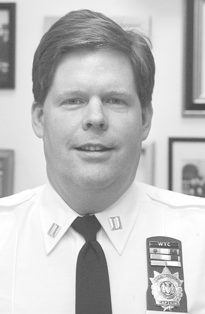By Albert Amateau
It’s been a crowded career with service as a patrol officer in Queens and Brooklyn, as an executive officer in two Brooklyn precincts, commander of a housing police service area and high-level policy and administration stints at Police Headquarters in Lower Manhattan. Dwyer also managed to earn some impressive academic degrees while on the force, including a master’s degree from Fordham University — in critical literary theory, no less — plus a year reading criminology in Cambridge, England, on a Fulbright Fellowship.
The precinct is bounded by Houston St. on the north, Allen and Pike Sts. on the west and the East River to the east and south.
In a precinct where a dozen major housing developments and co-ops contribute to a population of 60,000 — according to the 2000 U.S. Census — in an area of about three-fifths of a square mile, a growing concern is the number of bars, lounges and clubs that add hundreds of patrons to the nighttime population.
“When I got here in October four months ago, we had 96 bars and clubs; now it’s 101,” Dwyer said in a recent interview at the precinct stationhouse on Pitt St. near Broome St.
Noise and unruly patrons on the sidewalks generate the most complaints. “Clearly the area is saturated with clubs and a lot of places need to do more to keep patrons from creating disorder,” he said. “Some clubs have done what we ask — posting qualified people on the street for crowd control. But some clubs don’t want to spend the money and I find that inexcusable,” he said.
Dwyer has personally gone to troublesome nightlife venues, sometimes with staff from the Department of Buildings for overcrowding, or vice squad officers for underage drinking violations. “My intention is to ask for cooperation from clubs and to enforce the regulations, but common courtesy by patrons would solve a lot of problems. I’ve reminded club patrons on the street that people live here,” he said.
The precinct has a high Asian population with many Chinese immigrants, Dwyer noted. To help build a trusting relationship between police and the Chinese community, Dwyer has added a police officer to the precinct community affairs office who speaks Cantonese, Barbara Jew. “A great name for a Chinese-speaking officer in this precinct,” he quipped.
“Being able to communicate is one of the real challenges here. People say, ‘Oh, you probably know this already,’ but we don’t always. Often the street knows more than we do,” Dwyer observed. “Right now we’re looking for two suspects who rob elderly Asian women in the lobbies and elevators of their buildings and we need people to trust us and talk to us,” he said. “It’s difficult in an immigrant community where people are anxious about their immigration status. But I’m looking for a robber or a rapist when I come to work, I’m not thinking about immigration issues,” he said.
Last year’s increase in grand larceny in the precinct was largely driven by complaints by patrons of bars and clubs. “We keep hearing, ‘I left my bag on the floor,’ or ‘I left my wallet on the bar when I went to the bathroom for a minute.’” Dwyer said. He also warned about auto break-ins. “If you own a car like a Honda Civic or Accord or a Toyota Camry you have to be careful where you leave it. Particularly 1996 to 2000 models. There’s a rich market in [auto] parts,” he said.
While burglaries declined last year, crime is high on Dwyer’s priorities. Air conditioners inserted into windows near fire escapes are opportunities for illegal entry and residents should take extra precautions. “Low-quality locks on doors are another problem,” he said.
A standard procedure following a burglary report in the Seventh Precinct is a visit to the break-in location by Officer Ruben Tegada, the precinct’s crime-prevention officer, Dwyer said. “He checks on the locks at the location and then goes to the rest of the building to advise people about how to secure their homes and businesses.”
Dwyer’s decision to join the N.Y.P.D. was a natural one. His father had been a police officer in Queens for many years, and a second cousin was also a city police officer. He went to a small college, Cathedral College in Queens and became a policeman soon after graduation. He pursued his graduate degrees as a part-time scholar while a member of the police department.
And a masters in literary theory?
“Sure, my thesis is still on file in the Fordham library,” he said. “You could read it if you want. I tried to counter Jacques Derrida by using Aristotle…. I wrote it but I don’t understand it.”
Dwyer’s police promotions came quickly; he made sergeant after five years, lieutenant in 1997 and captain in 2004.
Since reaching the rank of captain, Dwyer has gone through a dizzying variety of assignments; two weeks at Madison Square Garden during the Republican National Convention in 2004, administrative work at headquarters, service in the two Brooklyn precincts and a housing police command, back to Police Plaza and then to the Seventh Precinct in October.
“I had six commands in two years. There were days when I was going to work that I had to make sure I was going to the right place,” he said. Dwyer is ready for a longer stay at the Seventh Precinct. “It takes a while to know a precinct and I’m still learning,” he said.
WWW Downtown Express


































